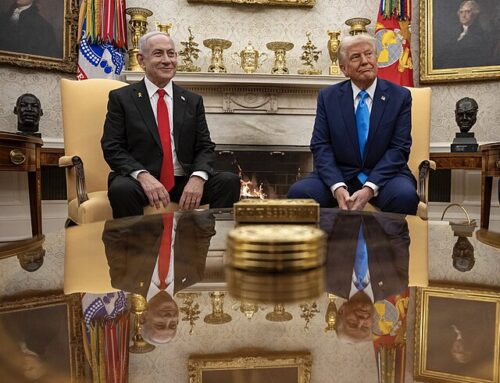Dalyat al Carmel is one of two Druse villages near Haifa. Cousins who hosted us for a few days, took us there (as is their custom whenever I visit) to buy gifts, eat and shmooze with their friends of the Halabi clan. Traffic was heavy in Dalyat, as in the neighboring Druse village.
Interestingly, I learned from these cousins that some Israeli Jews also live there. (When Prof. Shibley Telhami of the University of Maryland addressed a Meretz USA board meeting a couple of years ago, he informed me that he was an Israeli Arab who had lived in Dalyat.) So much for a system of enforced segregation resembling apartheid.
The Druse (also transliterated as “Druze”) are an Arabic-speaking people who have a unique religion and a separate identity from other Arabs. Their largest communities are in Israel, Lebanon and Syria; each makes a point of fitting in politically with the majority. In Lebanon, where there is no single majority, they constitute a distinct ethnic faction safeguarding their interests in the rough and tumble of its often chaotic and violent reality. In Syria and the Golan Heights, they are loyal to the Assad regime. Across the border, they are loyal to Israel, with their 100,000-strong community willingly subject to military conscription on the same basis as Jews. The much smaller Circassian community is similarly subject to military conscription on an equal basis as Jews; the Circassians are Muslims but not Arabs.
During our stay at his home, our cousin Uzi took us to his favorite eatery (twice in four days, in my case): a falafel and shwarma place at a crossroads called Checkpost, a name left over from the British Mandate when soldiers manned a checkpoint there. I was surprised when he told me that the owner and his sons working there are Arabs; almost all of the customers were Jews.
I am informed by Daniela Cohen – a member of Kibbutz Ein Gedi who works at the resort and hosts a lovely early-morning tour of its botanical gardens – that the Arabic speakers we saw as fellow guests were Druse and not generic Israeli Arabs as I had thought. But Arabs were very much in evidence in Akko – the mixed Galilee city that was once the Crusader stronghold known as Acre. And we chatted with a family from the Arab city of Nazareth who shared the cable car ride with us at Rosh HaNikra. They asked if we had visited their town; I explained that one set of cousins had invited us to go to lunch in Nazareth but that we had already made other plans near Haifa. We have a “rain check” for that lunch in Nazareth.
We were driven to Rosh HaNikra by still another cousin who hosted us for a day and two nights at Kibbutz Kabri (or Cabri) near Naharia. Earlier, we took a swim at the kibbutz pool, where we saw many Arab families enjoying their Saturday leisure time. My cousin Gila explained that these were the families of employees at kibbutz enterprises – of which there are quite a few, including two industrial factories, a high-end gourmet restaurant (owned in part by an Arab family), guest houses and agricultural fields. There was a controversy last year in which the kibbutz was accused of racism for excluding Arabs and Druse from pool membership; the decision was then made to restrict pool use to the kibbutz community and to workers’ families.
Gila told us that outside membership had to be restricted because the facilities were not adequate to be available to all. She was satisfied that including the families of workers now allayed the charge of racism. Some of the workers we met when we toured the factories were families of Lebanese militiamen allied with Israel, who had fled when Israel withdrew from the security zone in 2000. Kibbutz Kabri housed many of these refugees and hosted the ulpan course that taught them Hebrew.
As explained previously, Israeli Arabs have reason to complain of discrimination. But under any reasonable definition of the word, they are not truly oppressed — at least not in ways that Israel’s severest critics imagine.



I don’t believe that Israel practices apartheid against its Arab citizens–at least not since 1966. But I fail to understand how Shibley Telhami’s former residence in Dalyat al-Carmel is proof against that charge. The charge is that Israel practices apartheid on national or ethnic lines, not religious ones. Thus, the fact that a Christian Arab lives in a Druze village is hardly evidence against that charge.
Tom is correct, but I referred to Israeli Jews living in Dalyat as well. My cousins informed me of young Israeli Jews also living there.
Dear Mr Selliger: I can’t believe you really meant to say: “Jewish by blood”! Response please?
This should have been a comment for Part 2, but Lustiger and the monk I referred to in Part 2 were, indeed, “Jewish by blood” rather than by faith. If this phrase sounds racialist, I’m sorry; I’m only saying that these people were Jewish by parentage or ancestry.